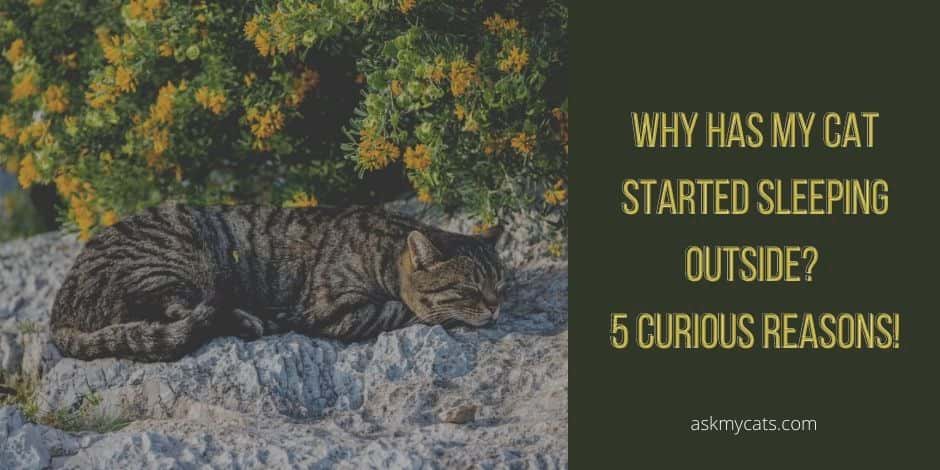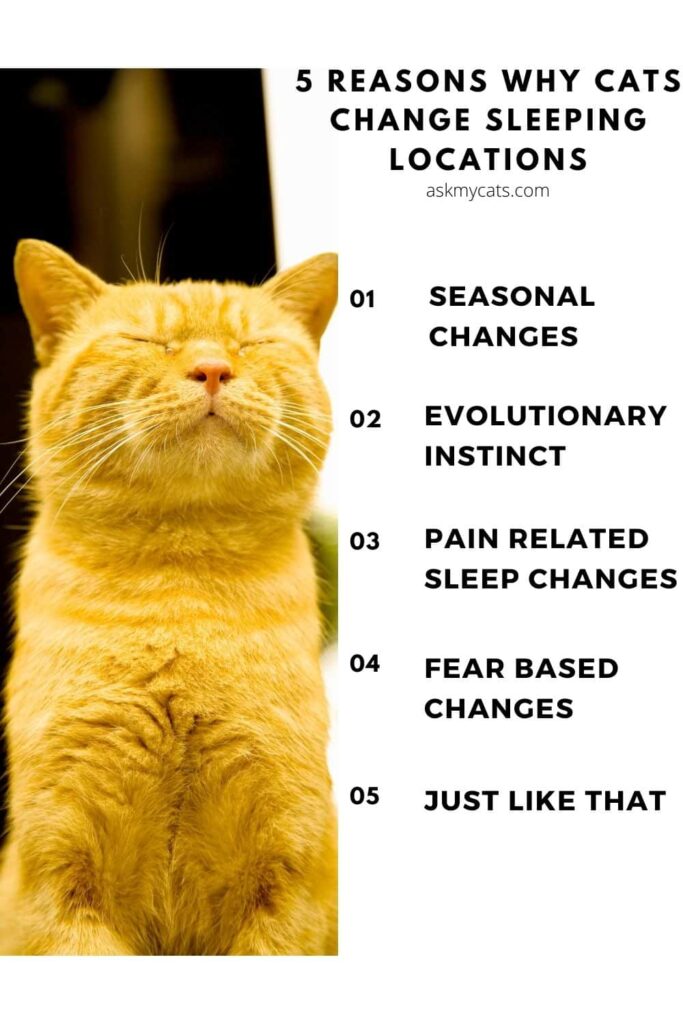Has your cat suddenly started sleeping outside, leaving you worried and confused? Don’t worry, your cat hasn’t suddenly started hating you. Nor does your cat want a new roomie. It’s perfectly normal for your cat to change its sleeping location, and I explain 5 reasons why!
Cats are easily one of the few animals that sleep a LOT. And by LOT, I mean really – A LOT! So much that I wish I were a cat!
It is normal for your cat to start sleeping outside. It can be because of seasonal or temperature changes, or simply because of its wild instincts. Your cat does not hate you just because it has started sleeping outside suddenly.
An average kitten (and young cat) can be seen sleeping for about 16 hours a day. And if you think that’s a lot, wait until you hear how much an older cat can sleep.
If you guessed the number 20, you’re correct! Older cats spend around 20 of the 24 hours of a day either sleeping or snoozing.
Their inclination to sleep comes as a package of their evolutionary instincts from the wild. The wild cats had two primary things to do when awake – hunt for food, and eat that food.
And since they needed the energy to chase prey and hunt, they’d spend the time they didn’t use for eating, by sleeping.


Give Your Cat the Perfect Day
Get the Free Ebook!
Is My Cat Sleeping All The Time?
Well, yes and no.
Although your cat may seem to be sleeping all the time, most of the time it is just snoozing.
Snoozing is basically a lot like the power saver mode of your mobile phone.
Your cat is in its energy-saving mode – it is resting, but it is still alert enough to wake up in seconds.
5 Curious Reasons Why Your Cat Has Started Sleeping Outside

While the changes in sleeping patterns may look abrupt, they aren’t necessarily worrisome.
It is normal for cats to develop changes in their sleeping timings and locations many times during their lifetime.
Now, it is important to know that there isn’t exactly thorough research or study done on the sleeping patterns of a cat in depth.
However, a lot of the data and information collected and available on the internet is based on observations and first-hand experiences.
So, while these may not be experimental results, the possibilities and guesses are fairly reliable.
Let’s look at these 5 curious reasons:
1. Seasonal Changes
Is it the summer season? Or have you started switching the cooler off? Or did you finally get that extra warm blanket from the closet?
Well, whatever the changes may be – if they’ve made the room warm enough for your cat to feel uncomfortable to sleep in, he or she might have shifted to a cooler environment outside.
2. Evolutionary Instinct
This might be one of the lesser known facts about cats, but they haven’t yet been domesticated to the level of their furry counterparts 0- doggos.
In the wilderness, cats would constantly be on their toes and change their sleeping locations often so as to not be noticed by a predator. They kept carrying their routines as a way of protecting themselves.
Moreover, in the wild, changing their location often came with the added advantage of keeping the annoying and disease-causing fleas and other parasites away.
So, not only did your cat’s ancestors move around and change their sleeping locations to avoid being eaten by predators, but also it helped them stay healthier in an environment where hygiene wasn’t exactly an available luxury.
You might also like to know the reasons why doesn’t my cat sleep with me
3. Pain-related sleep changes
This can be a little worrisome. Cats are known by many to be “silent sufferers”. They often do not show very visible signs of distress. So, sometimes, their changes in sleep patterns could be subtle causes of some underlying distress.
However, this often isn’t the case. Also, importantly, just a change in where your cat sleeps isn’t exactly a bad sign. Symptoms of distress are often accompanied by changes in body language.
So, when your cat changes its sleeping location and starts sleeping outside, just observe its body language for any unusual signs and symptoms initially. If everything else is pretty normal – like their appetite and poop and pee time – you have no reasons to worry.
You might like to read about where do cats sleep outside at night
4. Fear-based changes
Has your heater started making that annoying vibratory sound? Or did you get a new roomie? Well, whatever it may be 0- cats, being territorial animals, do not like changes in places where they sleep.
So, until they get accustomed to the new roomie, or until you get that heater problem resolved, your cat will not sleep inside with you.
Your cat isn’t hating you; it’s hating the discomfort of annoyance.
5. Just like that
Cats are quirky. Each cat has a different personality and different set of cute, and sometimes really strange, quirks.
So, maybe it’s the new cushion that your cat doesn’t like, or maybe the new plant outside that your cat loves, or maybe there is no reason at all and your cat just wants to sleep in that spot because it is a part of his or her territory!
Also, check out why does my cat wait outside my bedroom door
Frequently Asked Questions
Is it OK for cats to sleep outside?
Cats are pretty well adapted for cold weather, but when the temperature dips below freezing they are susceptible to hypothermia and frostbite. During periods of cold weather, cats will go looking for a warm place to hunker down. Building an outside shelter for a cat can be an inexpensive and fun project for the family.
What does my cat do outside at night?
By night, cats feel free to explore and hunt. With fewer humans and cars on the road, cats are emboldened to find new territory. The lack of competing smells and sounds also makes hunting easier. Your cat may visit another home at night or seek food and water elsewhere.
Why does my cat keep meowing outside my door?
To ask to be let in or out.
Meowing is the cat’s primary way to let you know what she wants. If she wants to go outside, she’ll likely learn to meow at the door. Likewise, if she’s outdoors and wants in, she’ll meow to get you to let her back inside.
How do cats stay warm outside?
Mylar blankets cut to size can also help cats retain warmth. Avoid using conventional fabric blankets or towels, which absorb moisture and can make the interior cold. Placing the shelter on a pallet or other surface to raise it off the ground can also help to insulate it. Place shelters in out-of-the-way areas.
Why has my cat started staying outside?
Most cats, if they could choose, would elect to be indoor/outdoor cats, roaming in nature when they feel adventurous, and coming indoors when they want to be warm and safe. If he’s confident and curious by nature, of course, he wants to explore what’s outside the door. It’s normal for a cat to want to go outside.
What do cats do when outside?
An outdoor cat is far less likely to become overweight, which is due to the fact that the great outdoors just has so much to do! When out and about, cats are more likely to spend their time climbing, running, and exploring which is all excellent for their physical health.
What sense do cats use at night?
Cat sense of sight
When it comes to cats’ ability to see in the dark, a study found that a huge part of what allows them to operate so well at night is that cats can see ultraviolet light that we humans can’t even detect. However, their daylight eyesight is less heightened as they’re mostly evening and night hunters.
Why does my cat meow outside my door at night?
If your cat is active, curious, and loves to play, then they may be waking you up at night with their meows seeking your attention. Cats will do many things to get attention, including scratching at your bedroom door, pawing at you, bumping into you, flopping down on the floor in front of you, and, of course, meowing.
What is the best bedding for outdoor cats?
Straw
Straw is the best option to use for bedding for any outdoor cat. It’s made from dry stalks that are left over after harvesting and do a wonderful job repelling moisture, which means that cats won’t get cold and wet when sleeping on straw.
How long can an indoor cat survive outside?
2-5 years
The Perks of Being an Indoor Cat
The more comfortable life of an indoor cat significantly increases his lifespan. An indoor cat may live 15-17 years, while the life expectancy for outdoor cats is only 2-5 years, according to researchers at the University of California-Davis.
Final Words

There isn’t always a perfect reason why cats do what they do.
But don’t worry.
You’re not the only one who loves speculating about the what’s and why’s and how’s of our furry little feline babies. We are all guilty of it.
What are your speculations or guesses as to why your buddy has started sleeping outside? Let me know in the comments section below!
You might also like to read in detail about my cat doesn’t want to stay inside anymore

My old cat of 16trs has started to sleep
Outside on a garden chair under table. She never did
This before . She eats and will
Not come in the warm. She stays under the table in the rain cold .
This is really unusual for her . This has gone on for a month
Now
Hi Theresa,
Sorry to hear that, it must be unsettling for you not knowing why she has suddenly changed to sleeping outside. Has anything changed in your house? Is it noisier? Could she be in pain and so needs her own space and is avoiding being touched? I’m just providing you with some thoughts, I’m no expert! I hope things get resolved soon. Best wishes, Rachel
I have 2 male, neutered cats 7 & 8 years old. They are indoor/outdoor cats. About 4 or 5 days ago they both started staying outside all the time except to come in to eat. There is a little table & 2 chairs on the patio by the windows & that’s where they lay & sleep all day. They used to lay around in the house most of the day. It’s hot outside so I don’t understand why they wouldn’t want to be in the cool house.
Cats are significantly less effective at regulating their body temperature than people are, which makes the situation worse. They just slightly perspire from their paw pads, which is insufficient to adequately cool their entire body in hot conditions.
As a result, they prefer a hot climate to a cool, dry one.